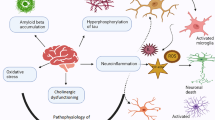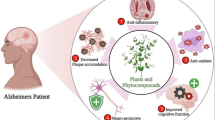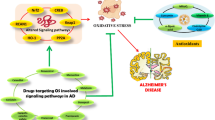Abstract
Alzheimer’s disease (AD) is presented as an age-related neurodegenerative disease with multiple cognitive deficits and amyloid β (Aβ) accumulation is the most important involved factor in its development. Nobiletin is a bioflavonoid isolated from citrus fruits peels with anti-inflammatory and anti-oxidative activity as well as anti-dementia property that has shown potency to ameliorate intracellular and extracellular Ab. The aim of the present study was to assess protective effect of nobiletin against Aβ1−40-induced cognitive impairment as a consistent model of AD. After bilateral intrahippocampal (CA1 subfield) injection of Aβ1−40, rats were treated with nobiletin (10 mg/kg/day; p.o.) from stereotaxic surgery day (day 0) till day + 7. Cognition function was evaluated in a battery of behavioral tasks at week 3 with final assessment of hippocampal oxidative stress and inflammation besides Nissl staining and 3-nitrotyrosine (3-NT) immunohistochemistry. Analysis of behavioral data showed notable and significant improvement of alternation in Y maze test, discrimination ratio in novel object recognition task, and step through latency in passive avoidance test in nobiletin-treated Aβ group. Additionally, nobiletin treatment was associated with lower hippocampal levels of MDA and ROS and partial reversal of SOD activity and also improvement of Nrf2 with no significant effect on GSH and catalase. Furthermore, nobiletin attenuated hippocampal neuroinflammation in Aβ group as shown by lower tissue levels of TLR4, NF-kB, and TNFa. Histochemical findings showed that nobiletin prevents CA1 neuronal loss in Nissl staining in addition to its alleviation of 3-nitrotyrosine (3-NT) immunoreactivity as a marker of nitrosative stress. Collectively, these findings indicated neuroprotective and anti-dementia potential of nobiletin that is partly attributed to its anti-oxidative, anti-nitrosative, and anti-inflammatory property associated with proper modulation of TLR4/NF-kB/Nrf2 pathways.





Similar content being viewed by others
Data availability
The data sets generated and analyzed during the current study are available from the corresponding author on reasonable request.
References
Amarsanaa K, Kim HJ, Ko EA, Jo J, Jung SC (2021) Nobiletin exhibits neuroprotective effects against mitochondrial complex I inhibition via regulating apoptotic signaling. Exp Neurobiol 30:73–86. https://doi.org/10.5607/en20051
Antunes M, Biala G (2012) The novel object recognition memory: neurobiology, test procedure, and its modifications. Cogn Process 13:93–110. https://doi.org/10.1007/s10339-011-0430-z
Baluchnejadmojarad T, Mohamadi-Zarch SM, Roghani M (2019) Safranal, an active ingredient of saffron, attenuates cognitive deficits in amyloid β-induced rat model of Alzheimer’s disease: underlying mechanisms. Metab Brain Dis 34:1747–1759. https://doi.org/10.1007/s11011-019-00481-6
Braak H, Braak E (1991) Neuropathological stageing of Alzheimer-related changes. Acta Neuropathol 82:239–259. https://doi.org/10.1007/bf00308809
Bradford MM (1976) A rapid and sensitive method for the quantitation of microgram quantities of protein utilizing the principle of protein-dye binding. Anal Biochem 72:248–254. https://doi.org/10.1006/abio.1976.9999
Braidy N, Behzad S, Habtemariam S, Ahmed T, Daglia M, Nabavi SM, Sobarzo-Sanchez E, Nabavi SF (2017) Neuroprotective effects of citrus fruit-derived flavonoids, nobiletin and Tangeretin in Alzheimer’s and Parkinson’s disease. CNS Neurol Disord Drug Targets 16:387–397. https://doi.org/10.2174/1871527316666170328113309
Breijyeh Z, Karaman R (2020) Comprehensive review on Alzheimer’s disease: causes and treatment. Molecules 25. https://doi.org/10.3390/molecules25245789
Butterfield DA, Griffin S, Munch G, Pasinetti GM (2002) Amyloid beta-peptide and amyloid pathology are central to the oxidative stress and inflammatory cascades under which Alzheimer’s disease brain exists. J Alzheimers Dis 4:193–201. https://doi.org/10.3233/jad-2002-4309
Choi Y, Kim Y, Ham H, Park Y, Jeong HS, Lee J (2011) Nobiletin suppresses adipogenesis by regulating the expression of adipogenic transcription factors and the activation of AMP-activated protein kinase (AMPK). J Agric Food Chem 59:12843–12849. https://doi.org/10.1021/jf2033208
Clark DO, Xu H, Moser L, Adeoye P, Lin AW, Tangney CC, Risacher SL, Saykin AJ, Considine RV, Unverzagt FW (2019) MIND food and speed of processing training in older adults with low education, the MINDSpeed Alzheimer’s disease prevention pilot trial. Contemp Clin Trials 84:105814. https://doi.org/10.1016/j.cct.2019.105814
Das SS, Nair SS, Kavitha S, Febi J, Indira M (2015) Atorvastatin improves Y-maze learning behaviour in nicotine treated male albino rats. Pharmacol Biochem Behav 138:117–122. https://doi.org/10.1016/j.pbb.2015.09.015
De Leon AD, Borges J (2020) Evaluation of oxidative stress in biological samples using the Thiobarbituric acid reactive substances assay. J Vis Expdoi. https://doi.org/10.3791/61122
Dias HK, Brown CL, Polidori MC, Lip GY, Griffiths HR (2015) LDL-lipids from patients with hypercholesterolaemia and Alzheimer’s disease are inflammatory to microvascular endothelial cells: mitigation by statin intervention. Clin Sci (Lond) 129:1195–1206. https://doi.org/10.1042/cs20150351
Doig AJ (2018) Positive feedback loops in Alzheimer’s disease: the Alzheimer’s feedback hypothesis. J Alzheimers Dis 66:25–36. https://doi.org/10.3233/jad-180583
Duarte AI, Candeias E, Alves IN, Mena D, Silva DF, Machado NJ, Campos EJ, Santos MS, Oliveira CR, Moreira PI (2020) Liraglutide protects against brain Amyloid-β(1–42) accumulation in female mice with early Alzheimer’s disease-like pathology by partially rescuing oxidative/nitrosative stress and inflammation. Int J Mol Sci 21. https://doi.org/10.3390/ijms21051746
Fahanik-Babaei J, Baluchnejadmojarad T, Nikbakht F, Roghani M (2019) Trigonelline protects hippocampus against intracerebral Aβ(1–40) as a model of Alzheimer’s disease in the rat: insights into underlying mechanisms. Metab Brain Dis 34:191–201. https://doi.org/10.1007/s11011-018-0338-8
Fan L, Mao C, Hu X, Zhang S, Yang Z, Hu Z, Sun H, Fan Y, Dong Y, Yang J, Shi C, Xu Y (2019) New insights into the pathogenesis of Alzheimer’s disease. Front Neurol 10:1312. https://doi.org/10.3389/fneur.2019.01312
Ghofrani S, Joghataei MT, Mohseni S, Baluchnejadmojarad T, Bagheri M, Khamse S, Roghani M (2015) Naringenin improves learning and memory in an Alzheimer’s disease rat model: Insights into the underlying mechanisms. Eur J Pharmacol 764:195–201. https://doi.org/10.1016/j.ejphar.2015.07.001
Grossmann K (2021) Alzheimer’s disease-rationales for potential treatment with the thrombin inhibitor dabigatran. Int J Mol Sci 22. https://doi.org/10.3390/ijms22094805
Güvenç M, Cellat M, Uyar A, Özkan H, Gokcek İ, İsler CT, Yakan A (2020) Nobiletin protects from renal ischemia-reperfusion injury in rats by suppressing inflammatory cytokines and regulating iNOS-eNOS expressions. Inflammation 43:336–346. https://doi.org/10.1007/s10753-019-01123-w
Hardy J, Allsop D (1991) Amyloid deposition as the central event in the aetiology of Alzheimer’s disease. Trends Pharmacol Sci 12:383–388. https://doi.org/10.1016/0165-6147(91)90609-v
He Z, Li X, Chen H, He K, Liu Y, Gong J, Gong J (2016) Nobiletin attenuates lipopolysaccharide/D–galactosamine–induced liver injury in mice by activating the Nrf2 antioxidant pathway and subsequently inhibiting NF–κB–mediated cytokine production. Mol Med Rep 14:5595–5600. https://doi.org/10.3892/mmr.2016.5943
Hodges DM, DeLong JM, Forney CF, Prange RK (1999) Improving the thiobarbituric acid-reactive-substances assay for estimating lipid peroxidation in plant tissues containing anthocyanin and other interfering compounds. Planta 207:604–611. https://doi.org/10.1007/s004250050524
Ijaz MU, Tahir A, Samad A, Anwar H (2021) Nobiletin ameliorates nonylphenol-induced testicular damage by improving biochemical, steroidogenic, hormonal, spermatogenic, apoptotic and histological profile. Hum Exp Toxicol 40:403–416. https://doi.org/10.1177/0960327120950007
Jeong KH, Jeon MT, Kim HD, Jung UJ, Jang MC, Chu JW, Yang SJ, Choi IY, Choi MS, Kim SR (2015) Nobiletin protects dopaminergic neurons in the 1-methyl-4-phenylpyridinium-treated rat model of Parkinson’s disease. J Med Food 18:409–414. https://doi.org/10.1089/jmf.2014.3241
Kazak F, Akalın PP, Yarım GF, Başpınar N, Özdemir Ö, Ateş MB, Altuğ ME, Deveci MZY (2021) Protective effects of nobiletin on cisplatin induced neurotoxicity in rats. Int J Neurosci :1–7. https://doi.org/10.1080/00207454.2021.1896507
Khajevand-Khazaei MR, Ziaee P, Motevalizadeh SA, Rohani M, Afshin-Majd S, Baluchnejadmojarad T, Roghani M (2018) Naringenin ameliorates learning and memory impairment following systemic lipopolysaccharide challenge in the rat. Eur J Pharmacol 826:114–122. https://doi.org/10.1016/j.ejphar.2018.03.001
Khajevand-Khazaei MR, Azimi S, Sedighnejad L, Salari S, Ghorbanpour A, Baluchnejadmojarad T, Mohseni-Moghaddam P, Khamse S, Roghani M (2019) S-allyl cysteine protects against lipopolysaccharide-induced acute kidney injury in the C57BL/6 mouse strain: Involvement of oxidative stress and inflammation. Int Immunopharmacol 69:19–26. https://doi.org/10.1016/j.intimp.2019.01.026
Kiasalari Z, Heydarifard R, Khalili M, Afshin-Majd S, Baluchnejadmojarad T, Zahedi E, Sanaierad A, Roghani M (2017) Ellagic acid ameliorates learning and memory deficits in a rat model of Alzheimer’s disease: an exploration of underlying mechanisms. Psychopharmacology 234:1841–1852. https://doi.org/10.1007/s00213-017-4589-6
Kim JM, Lee U, Kang JY, Park SK, Shin EJ, Kim HJ, Kim CW, Kim MJ, Heo HJ (2020) Anti-amnesic effect of walnut via the regulation of BBB function and neuro-inflammation in Aβ(1–42)-induced mice. Antioxid (Basel) 9. https://doi.org/10.3390/antiox9100976
Kim CM, Montal V, Diez I, Orwig W, Sepulcre J (2021a) Network interdigitations of Tau and amyloid-beta deposits define cognitive levels in aging. Hum Brain Mappdoi. https://doi.org/10.1002/hbm.25350
Kim E, Nohara K, Wirianto M, Escobedo G Jr, Lim JY, Morales R, Yoo SH, Chen Z (2021b) Effects of the clock modulator nobiletin on circadian rhythms and pathophysiology in female mice of an Alzheimer’s disease model. Biomolecules 11. https://doi.org/10.3390/biom11071004
Kimura J, Shimizu K, Kajima K, Yokosuka A, Mimaki Y, Oku N, Ohizumi Y (2018) Nobiletin reduces intracellular and extracellular β-Amyloid in iPS cell-derived Alzheimer’s disease model neurons. Biol Pharm Bull 41:451–457. https://doi.org/10.1248/bpb.b17-00364
Krypotos AM, Effting M, Kindt M, Beckers T (2015) Avoidance learning: a review of theoretical models and recent developments. Front Behav Neurosci 9:189. https://doi.org/10.3389/fnbeh.2015.00189
Kunimasa K, Kuranuki S, Matsuura N, Iwasaki N, Ikeda M, Ito A, Sashida Y, Mimaki Y, Yano M, Sato M, Igarashi Y, Oikawa T (2009) Identification of nobiletin, a polymethoxyflavonoid, as an enhancer of adiponectin secretion. Bioorg Med Chem Lett 19:2062–2064. https://doi.org/10.1016/j.bmcl.2009.02.002
Lee HJ, Lee SK, Lee DR, Choi BK, Le B, Yang SH (2019) Ameliorating effect of Citrus aurantium extracts and nobiletin on β–amyloid (1–42)–induced memory impairment in mice. Mol Med Rep 20:3448–3455. https://doi.org/10.3892/mmr.2019.10582
Lee JH, Ahn NH, Choi SB, Kwon Y, Yang SH (2021) Natural products targeting amyloid beta in Alzheimer’s disease. Int J Mol Sci 22. https://doi.org/10.3390/ijms22052341
Leger M, Quiedeville A, Bouet V, Haelewyn B, Boulouard M, Schumann-Bard P, Freret T (2013) Object recognition test in mice. Nat Protoc 8:2531–2537. https://doi.org/10.1038/nprot.2013.155
Li W, Wang X, Zhi W, Zhang H, He Z, Wang Y, Liu F, Niu X, Zhang X (2017) The gastroprotective effect of nobiletin against ethanol-induced acute gastric lesions in mice: impact on oxidative stress and inflammation. Immunopharmacol Immunotoxicol 39:354–363. https://doi.org/10.1080/08923973.2017.1379088
Li ZR, Yang L, Zhen J, Zhao Y, Lu ZN (2018) Nobiletin protects PC12 cells from ERS-induced apoptosis in OGD/R injury via activation of the PI3K/AKT pathway. Exp Ther Med 16:1470–1476. https://doi.org/10.3892/etm.2018.6330
Lin LW, Tsai FH, Lan WC, Cheng YD, Lee SC, Wu CR (2019) Steroid-enriched fraction of Achyranthes bidentata protects amyloid β Peptide 1-40-Induced cognitive dysfunction and neuroinflammation in rats. Mol Neurobiol 56:5671–5688. https://doi.org/10.1007/s12035-018-1436-7
Liu H, Deng Y, Gao J, Liu Y, Li W, Shi J, Gong Q (2015) Sodium hydrosulfide attenuates beta-amyloid-induced cognitive deficits and neuroinflammation via modulation of MAPK/NF-κB pathway in rats. Curr Alzheimer Res 12:673–683. https://doi.org/10.2174/1567205012666150713102326
Liu XQ, Deng YX, Dai Z, Hu T, Cai WW, Liu HF, Li H, Zhu WL, Li BY, Wang Q, Zhang SJ (2020) Sodium tanshinone IIA sulfonate protects against Aβ(1–42)-induced cellular toxicity by modulating Aβ-degrading enzymes in HT22 cells. Int J Biol Macromol 151:47–55. https://doi.org/10.1016/j.ijbiomac.2020.02.040
Lotz M, Ebert S, Esselmann H, Iliev AI, Prinz M, Wiazewicz N, Wiltfang J, Gerber J, Nau R (2005) Amyloid beta peptide 1–40 enhances the action of Toll-like receptor-2 and – 4 agonists but antagonizes Toll-like receptor-9-induced inflammation in primary mouse microglial cell cultures. J Neurochem 94:289–298. https://doi.org/10.1111/j.1471-4159.2005.03188.x
Mao Q, Liang X, Wu Y, Lu Y (2019) Nobiletin protects against myocardial injury and myocardial apoptosis following coronary microembolization via activating PI3K/Akt pathway in rats. Naunyn Schmiedebergs Arch Pharmacol 392:1121–1130. https://doi.org/10.1007/s00210-019-01661-y
McKhann GM, Knopman DS, Chertkow H, Hyman BT, Jack CR Jr, Kawas CH, Klunk WE, Koroshetz WJ, Manly JJ, Mayeux R, Mohs RC, Morris JC, Rossor MN, Scheltens P, Carrillo MC, Thies B, Weintraub S, Phelps CH (2011) The diagnosis of dementia due to Alzheimer’s disease: recommendations from the National Institute on Aging-Alzheimer’s Association workgroups on diagnostic guidelines for Alzheimer’s disease. Alzheimers Dement 7:263–269. https://doi.org/10.1016/j.jalz.2011.03.005
Mohamed WA, Salama RM, Schaalan MF (2019) A pilot study on the effect of lactoferrin on Alzheimer’s disease pathological sequelae: Impact of the p-Akt/PTEN pathway. Biomed Pharmacother 111:714–723. https://doi.org/10.1016/j.biopha.2018.12.118
Mokhtari Z, Baluchnejadmojarad T, Nikbakht F, Mansouri M, Roghani M (2017) Riluzole ameliorates learning and memory deficits in Aβ25-35-induced rat model of Alzheimer’s disease and is independent of cholinoceptor activation. Biomed Pharmacother 87:135–144. https://doi.org/10.1016/j.biopha.2016.12.067
Nagase H, Omae N, Omori A, Nakagawasai O, Tadano T, Yokosuka A, Sashida Y, Mimaki Y, Yamakuni T, Ohizumi Y (2005) Nobiletin and its related flavonoids with CRE-dependent transcription-stimulating and neuritegenic activities. Biochem Biophys Res Commun 337:1330–1336. https://doi.org/10.1016/j.bbrc.2005.10.001
Nakajima A, Yamakuni T, Matsuzaki K, Nakata N, Onozuka H, Yokosuka A, Sashida Y, Mimaki Y, Ohizumi Y (2007) Nobiletin, a citrus flavonoid, reverses learning impairment associated with N-methyl-D-aspartate receptor antagonism by activation of extracellular signal-regulated kinase signaling. J Pharmacol Exp Ther 321:784–790. https://doi.org/10.1124/jpet.106.117010
Nakajima A, Ohizumi Y, Yamada K (2014) Anti-dementia activity of nobiletin, a citrus flavonoid: a review of animal studies. Clin Psychopharmacol Neurosci 12:75–82. https://doi.org/10.9758/cpn.2014.12.2.75
Nakajima A, Ohizumi Y (2019) Potential benefits of nobiletin, a citrus flavonoid, against Alzheimer’s disease and Parkinson’s disease. Int J Mol Sci 20. https://doi.org/10.3390/ijms20143380
Nguyen-Ngo C, Salomon C, Quak S, Lai A, Willcox JC, Lappas M (2020) Nobiletin exerts anti-diabetic and anti-inflammatory effects in an in vitro human model and in vivo murine model of gestational diabetes. Clin Sci (Lond) 134:571–592. https://doi.org/10.1042/cs20191099
Piermartiri TC, Figueiredo CP, Rial D, Duarte FS, Bezerra SC, Mancini G, de Bem AF, Prediger RD, Tasca CI (2010) Atorvastatin prevents hippocampal cell death, neuroinflammation and oxidative stress following amyloid-β(1–40) administration in mice: evidence for dissociation between cognitive deficits and neuronal damage. Exp Neurol 226:274–284. https://doi.org/10.1016/j.expneurol.2010.08.030
Qi G, Guo R, Tian H, Li L, Liu H, Mi Y, Liu X (2018) Nobiletin protects against insulin resistance and disorders of lipid metabolism by reprogramming of circadian clock in hepatocytes. Biochim Biophys Acta Mol Cell Biol Lipids 1863:549–562. https://doi.org/10.1016/j.bbalip.2018.02.009
Qi G, Mi Y, Fan R, Li R, Liu Z, Liu X (2019) Nobiletin protects against systemic inflammation-stimulated memory impairment via MAPK and NF-κB signaling pathways. J Agric Food Chem 67:5122–5134. https://doi.org/10.1021/acs.jafc.9b00133
Rabinovici GD (2019) Late-onset Alzheimer disease. Continuum (Minneap Minn) 25:14–33. https://doi.org/10.1212/con.0000000000000700
Raoufi S, Baluchnejadmojarad T, Roghani M, Ghazanfari T, Khojasteh F, Mansouri M (2015) Antidiabetic potential of salvianolic acid B in multiple low-dose streptozotocin-induced diabetes. Pharm Biol 53:1803–1809. https://doi.org/10.3109/13880209.2015.1008148
Rapaka D, Bitra VR, Ummidi R, Akula A (2021) Benincasa hispida alleviates amyloid pathology by inhibition of Keap1/Nrf2-axis: Emphasis on oxidative and inflammatory stress involved in Alzheimer’s disease model. Neuropeptides 88:102151. https://doi.org/10.1016/j.npep.2021.102151
Ray S, Corenblum MJ, Anandhan A, Reed A, Ortiz FO, Zhang DD, Barnes CA, Madhavan L (2018) A role for Nrf2 expression in defining the aging of hippocampal neural stem cells. Cell Transpl 27:589–606. https://doi.org/10.1177/0963689718774030
Sanabria-Castro A, Alvarado-Echeverría I, Monge-Bonilla C (2017) Molecular pathogenesis of alzheimer’s disease: An Update. Ann Neurosci 24:46–54. https://doi.org/10.1159/000464422
Shinto L, Quinn J, Montine T, Dodge HH, Woodward W, Baldauf-Wagner S, Waichunas D, Bumgarner L, Bourdette D, Silbert L, Kaye J (2014) A randomized placebo-controlled pilot trial of omega-3 fatty acids and alpha lipoic acid in Alzheimer’s disease. J Alzheimers Dis 38:111–120. https://doi.org/10.3233/jad-130722
Tsai FS, Wu LY, Yang SE, Cheng HY, Tsai CC, Wu CR, Lin LW (2015) Ferulic acid reverses the cognitive dysfunction caused by amyloid β peptide 1–40 through anti-oxidant activity and cholinergic activation in rats. Am J Chin Med 43:319–335. https://doi.org/10.1142/s0192415x15500214
Wang T, Wang F, Yu L, Li Z (2019) Nobiletin alleviates cerebral ischemic-reperfusion injury via MAPK signaling pathway. Am J Transl Res 11:5967–5977
Wang X, Fang H, Xu G, Yang Y, Xu R, Liu Q, Xue X, Liu J, Wang H (2020) Resveratrol prevents cognitive impairment in type 2 diabetic mice by upregulating Nrf2 expression and transcriptional level. Diabetes Metab Syndr Obes 13:1061–1075. https://doi.org/10.2147/dmso.S243560
Youn K, Lee S, Jun M (2019) Discovery of nobiletin from citrus peel as a potent inhibitor of β-Amyloid peptide toxicity. Nutrients 11. https://doi.org/10.3390/nu11112648
Zhang J, Song L, Kong W, Shao T, Wen X, Liu P, Chai X (2012) Study on effect and mechanism of salidroside on cognitive ability of Abeta1-40 -induced Alzheimer’s disease model rats. Zhongguo Zhong Yao Za Zhi 37:2122–2126
Zhang Q, Li J, Liu C, Song C, Li P, Yin F, Xiao Y, Li J, Jiang W, Zong A, Zhang X, Wang F (2015) Protective effects of low molecular weight chondroitin sulfate on amyloid beta (Aβ)-induced damage in vitro and in vivo. Neuroscience 305:169–182. https://doi.org/10.1016/j.neuroscience.2015.08.002
Zhang W, Hua H, Guo Y, Cheng Y, Pi F, Yao W, Xie Y, Qian H (2020) Torularhodin from Sporidiobolus pararoseus Attenuates d-galactose/AlCl(3)-induced cognitive impairment, oxidative stress, and neuroinflammation via the Nrf2/NF-κB pathway. J Agric Food Chem 68:6604–6614. https://doi.org/10.1021/acs.jafc.0c01892
Zhang K, Mizuma H, Zhang X, Takahashi K, Jin C, Song F, Gao Y, Kanayama Y, Wu Y, Li Y, Ma L, Tian M, Zhang H, Watanabe Y (2021) PET imaging of neural activity, β-amyloid, and tau in normal brain aging. Eur J Nucl Med Mol Imaging. https://doi.org/10.1007/s00259-021-05230-5
Acknowledgements
This research study was certified (grant # 120 − 94) and financially supported by Shahed University (Tehran, Iran) in 2017.
Author information
Authors and Affiliations
Contributions
R.GT, M.F., M.K, and S.K. performed study experiments and assisted in data analysis. Z.K. and M.R. designed the study, supervised the experiments, analyzed data, and prepared the draft of the manuscript. T.B. helped in study design, data analysis, and manuscript writing.
Corresponding authors
Ethics declarations
Conflict of interest
No conflict of interest is declared by the authors. The authors alone are accountable for the content and writing of the paper.
Additional information
Publisher’s Note
Springer Nature remains neutral with regard to jurisdictional claims in published maps and institutional affiliations.
Rights and permissions
About this article
Cite this article
Ghasemi-Tarie, R., Kiasalari, Z., Fakour, M. et al. Nobiletin prevents amyloid β1-40-induced cognitive impairment via inhibition of neuroinflammation and oxidative/nitrosative stress. Metab Brain Dis 37, 1337–1349 (2022). https://doi.org/10.1007/s11011-022-00949-y
Received:
Accepted:
Published:
Issue Date:
DOI: https://doi.org/10.1007/s11011-022-00949-y




